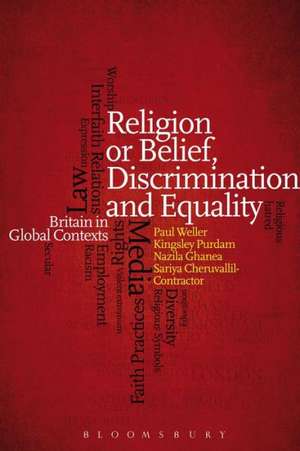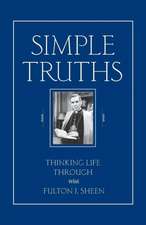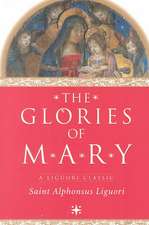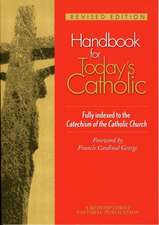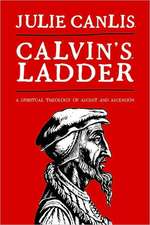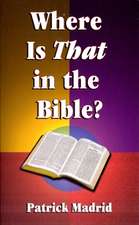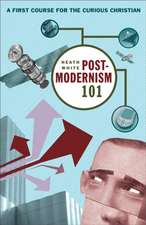Religion or Belief, Discrimination and Equality: Britain in Global Contexts
Autor Paul Weller, Dr Kingsley Purdam, Nazila Ghanea, Sariya Cheruvallil-Contractoren Limba Engleză Hardback – 6 noi 2013
Toate formatele și edițiile
| Toate formatele și edițiile | Preț | Express |
|---|---|---|
| Paperback (1) | 258.59 lei 6-8 săpt. | |
| Bloomsbury Publishing – 20 mai 2015 | 258.59 lei 6-8 săpt. | |
| Hardback (1) | 772.98 lei 6-8 săpt. | |
| Bloomsbury Publishing – 6 noi 2013 | 772.98 lei 6-8 săpt. |
Preț: 772.98 lei
Preț vechi: 989.98 lei
-22% Nou
Puncte Express: 1159
Preț estimativ în valută:
147.91€ • 155.14$ • 123.13£
147.91€ • 155.14$ • 123.13£
Carte tipărită la comandă
Livrare economică 02-16 aprilie
Preluare comenzi: 021 569.72.76
Specificații
ISBN-13: 9781441166203
ISBN-10: 1441166203
Pagini: 296
Dimensiuni: 156 x 234 x 23 mm
Greutate: 0.48 kg
Ediția:New.
Editura: Bloomsbury Publishing
Colecția Bloomsbury Academic
Locul publicării:London, United Kingdom
ISBN-10: 1441166203
Pagini: 296
Dimensiuni: 156 x 234 x 23 mm
Greutate: 0.48 kg
Ediția:New.
Editura: Bloomsbury Publishing
Colecția Bloomsbury Academic
Locul publicării:London, United Kingdom
Caracteristici
Empirical UK data set within context of global and international debates (e.g. US, Canada, Australia)
Notă biografică
Paul Weller is Professor of Inter-Religious Relations at the University of Derby and Visiting Fellow in the Oxford Centre for Christianity and Culture at Regent's Park College, University of Oxford, UK.Kingsley Purdam is Research Fellow in the Cathie Marsh Centre for Census and Survey Research at the University of Manchester, UK. Nazila Ghanea is Associate Professor in International Human Rights Law in the Department for Continuing Education and a member of the Law Faculty, University of Oxford, UK. She also serves as a member of the OSCE Advisory Panel of Experts on Freedom of Religion or Belief. Sariya Cheruvallil-Contractor is Postdoctoral Researcher in the Centre for Society, Religion and Belief at the University of Derby, UK.
Cuprins
Acknowledgments/ 1. The book, the research and key concepts/ 2. Historical perspectives on the law, rights, and religion or belief discrimination/ 3. Contemporary context of religion and belief, state and society/ 4. The law: a decade of continuity and change/ 5. Religion or belief discrimination: evidence and methods/ 6. Experience of unfair treatment in education, employment and media/ 7. Experience of unfair treatment in criminal justice and immigration; housing; health care; social services, planning and other services; and funding/ 8. Experience of unfair treatment from, between and within 'religious groups' and from political, community and other pressure groups/ 9. An analytical spectrum for understanding the evidence/ 10. Evidence-based signposts for future policy, law and practice/ Appendix: Selected list of relevant legal cases in England and Wales/ Bibliography/ Index
Recenzii
Religion or Belief, Discrimination and Equality: Britain in Global Contexts is an excellent resource for students and scholars interested in the social, political and legal phenomena that inform intellectual debates, inspire policy changes and shape public discourse. It is also sure to be appreciated by policy-makers, journalists and lawyers who want a coherent, jargon-free account of the data and issues that create the controversies that come across their desks every day. Written in a lucid, accessible manner, the authors have struck a remarkable balance between empirical data, social theory, historical context and personal perspectives related to the legal, cultural and political quandaries that face many contemporary liberal democracies.
Religion or Belief, Discrimination and Equality is a very important contribution to current debates about religion in the public sphere. Its strengths lie in the mass of fieldwork data that lie behind it, and the way it sets this data within a context and relates it to contemporary debates. The book provides a wealth of important data in an accessible and contextualized form, directly supports teaching in a number of areas, and is a useful reference tool for both scholars and students, which will no doubt help feed into debates in the public sphere on these issues.
Religion or Belief, Discrimination and Equality: Britain in Global Contexts provides a comprehensive review of the contemporary context of religion and belief equality. It charts the development of the legal protection against religious discrimination and provides significant new and rich data on religion or belief discrimination in key sectors of social life. In its conclusions it provides valuable insights for policy-makers and equality practitioners. The book makes a considerable contribution to the growing literature on law and religion and should be essential reading for anyone interested in a better understanding of the state of religious equality and diversity in the UK today.
This book makes an invaluable contribution to our understanding of the nature of religion or belief discrimination in Britain today. It is particularly useful to be able to compare the experiences of different religion or belief groups and to see the extent to which these have changed since the authors' previous analysis in the early 2000s.
This publication offers a thorough 360° view of religion and belief discrimination in Britain while at the same time contextualizing the British situation inside of a global context. It is a highly valuable resource for learners, practitioners and policy-makers trying to tackle some of the very difficult issues which we face today.
This comprehensive work, grounded in sound empirical research, opens a wide window onto the complex interrelations of religions and belief systems with policies and practices aimed at promoting equality and ameliorating discrimination. In an age of increasing diversity of personal and communal identities, including religious, the issue of maintaining communal cohesion that yet allows individual freedoms is critical. It is of the essence of the genuinely secular society that is premised on allowing for all sorts of diversities in a context of mutual respect and equal treatment before the Law. To echo the books concluding sentence, the evidence and analysis presented by the authors provides important and needful insight for policy-makers and practitioners concerned with the betterment of contemporary society. The findings and discussions contained in this volume are of crucial significance for Britain and beyond.
Paul Weller and his team have produced a magnificent report for our time, when religion and belief are of ever-increasing importance in public life. Their analysis of the current UK contexts: legal, religious and political, is comprehensive and nuanced in its recognition of the complexity of the UK context itself. The report is both timely and pertinent, in setting an agenda across the whole range of public policy in UK: not for radical change, nor for new law, but for steady adaptation of policy and practice to reflect the local realities of our variegated religious landscape. In Europe, the report deserves the widest possible circulation: as the first comprehensive national report on the religion and belief context from an equalities perspective, its methodology and approach should serve as a model for similar work in countries across Europe.
Religion or Belief, Discrimination and Equality is a very important contribution to current debates about religion in the public sphere. Its strengths lie in the mass of fieldwork data that lie behind it, and the way it sets this data within a context and relates it to contemporary debates. The book provides a wealth of important data in an accessible and contextualized form, directly supports teaching in a number of areas, and is a useful reference tool for both scholars and students, which will no doubt help feed into debates in the public sphere on these issues.
Religion or Belief, Discrimination and Equality: Britain in Global Contexts provides a comprehensive review of the contemporary context of religion and belief equality. It charts the development of the legal protection against religious discrimination and provides significant new and rich data on religion or belief discrimination in key sectors of social life. In its conclusions it provides valuable insights for policy-makers and equality practitioners. The book makes a considerable contribution to the growing literature on law and religion and should be essential reading for anyone interested in a better understanding of the state of religious equality and diversity in the UK today.
This book makes an invaluable contribution to our understanding of the nature of religion or belief discrimination in Britain today. It is particularly useful to be able to compare the experiences of different religion or belief groups and to see the extent to which these have changed since the authors' previous analysis in the early 2000s.
This publication offers a thorough 360° view of religion and belief discrimination in Britain while at the same time contextualizing the British situation inside of a global context. It is a highly valuable resource for learners, practitioners and policy-makers trying to tackle some of the very difficult issues which we face today.
This comprehensive work, grounded in sound empirical research, opens a wide window onto the complex interrelations of religions and belief systems with policies and practices aimed at promoting equality and ameliorating discrimination. In an age of increasing diversity of personal and communal identities, including religious, the issue of maintaining communal cohesion that yet allows individual freedoms is critical. It is of the essence of the genuinely secular society that is premised on allowing for all sorts of diversities in a context of mutual respect and equal treatment before the Law. To echo the books concluding sentence, the evidence and analysis presented by the authors provides important and needful insight for policy-makers and practitioners concerned with the betterment of contemporary society. The findings and discussions contained in this volume are of crucial significance for Britain and beyond.
Paul Weller and his team have produced a magnificent report for our time, when religion and belief are of ever-increasing importance in public life. Their analysis of the current UK contexts: legal, religious and political, is comprehensive and nuanced in its recognition of the complexity of the UK context itself. The report is both timely and pertinent, in setting an agenda across the whole range of public policy in UK: not for radical change, nor for new law, but for steady adaptation of policy and practice to reflect the local realities of our variegated religious landscape. In Europe, the report deserves the widest possible circulation: as the first comprehensive national report on the religion and belief context from an equalities perspective, its methodology and approach should serve as a model for similar work in countries across Europe.
